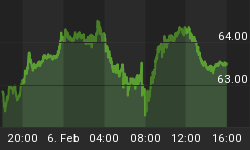When viewing the current market situation through a lens of inflationary policy vs. natural deflationary forces seeking to correct sublime levels of excess, a geek like me looks at the chart of the TNX and is absolutely transfixed.

Pictures like this, rather than the likes of the nominal Dow above are a big reason for the ongoing 'risk is high' droning in NFTRH. It is no coincidence that the risk profile was raised from the previous bullish stance as the TNX spiked to form the neck line at 4% in late spring/early summer, 2009.
The crux of the issue is that a breakout from the Inverted Head & Shoulders targets 6%. A correlated rate on the 30 year bond that we usually watch is close to 7% off of a potential H&S of its own. The problem is that these levels trigger our biggest picture monthly 'line in the sand', the 100 month exponential moving average, which changes something that has been assumed for decades (the US government's ability to use its treasury bonds, its confidence, to inflate at will by selling debt and printing money). The implication is that the change would be a secular thing, possibly introducing a hyperinflationary spiral.
I must admit to being confused by Captain Bernanke's 'damn the torpedoes' inflationary approach in the face of a bond market on the verge of rebellion while certain Fed members sound increasingly hawkish tones. The wizard's 'backbone' is that line - the monthly EMA 100 - under which treasury yields have remained for all those decades of confidence. The neck line shown above, if broken, triggers a level that busts the backbone.
We are at an extremely high risk juncture for both hyperinflation and deflation, because we are right on the line between the two with no confirmation yet as to which way this thing is going to break. Some Fed officials have expressed concerns that relate to the picture above, but thus far, the one who matters most, Bernanke remains unconvinced that inflation will become a problem.















